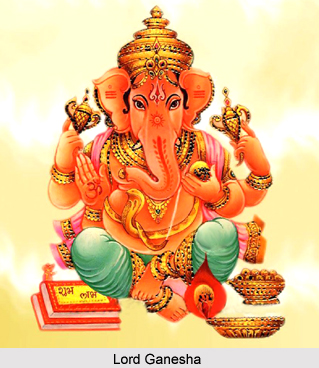 The Vinayakas of Kasi refer to the fifty six Vinayakas or forms of Lord Ganesha that are mentioned in the Kasi Khanda of the Skanda Purana. The Vinayakas are considered as specialized forms of Lord Ganesha. The fifty six Vinayakas protected and saved the city of Kasi from various demons and other evils. According to various Puranic texts, Dhundhi Ganesha adopted the fifty-six incarnations. He appeared at several places at different times in separate forms. The various incarnations of Dhundhi Ganesha were later categorized as the fifty six Vinayakas of Kasi. These forms are segmented into seven groups and each group contains eight forms or Vinayakas.
The Vinayakas of Kasi refer to the fifty six Vinayakas or forms of Lord Ganesha that are mentioned in the Kasi Khanda of the Skanda Purana. The Vinayakas are considered as specialized forms of Lord Ganesha. The fifty six Vinayakas protected and saved the city of Kasi from various demons and other evils. According to various Puranic texts, Dhundhi Ganesha adopted the fifty-six incarnations. He appeared at several places at different times in separate forms. The various incarnations of Dhundhi Ganesha were later categorized as the fifty six Vinayakas of Kasi. These forms are segmented into seven groups and each group contains eight forms or Vinayakas.
The fifty six Vinayakas of Kasi are mentioned as follows-
First Group of Vinayakas of Kasi
* Arka Vinayaka
* Durga Vinayaka
* Bhima Candi Vinayaka
* Delhi Vinayaka
* Uddanda Vinayaka
* Pacapana Vinayaka
* Karva Vinayaka
* Siddhi Vinayaka
Second Group of Vinayakas of Kasi
* Lambodara Vinayaka
* Kutadanta Vinayaka
* Kusmanda Vinayaka
* Manda Vinayaka
* Vikatadanta Vinayaka
* Rajaputra Vinayaka
* Pranava Vinayaka
* Salakatanka Vinayaka
Third Group of Vinayakas of Kasi
* Vakratunda Vinayaka
* Ekadanta Vinayaka
* Trimukha Vinayaka
* Paneasya Vinayaka
* Heramba Vinayaka
* Vighnaraja Vinayaka
* Varada Vinayaka
* Modakapriya Vinayaka
Fourth Group of Vinayakas of Kasi
* Abhayada Vinayaka
* Sirhhatunda Vinayaka
* Sonitaksa Vinayaka
* Ksipraprasada Vinayaka
* Chintamani Vinayaka
* Dantahasta Vinayaka
* Picindala Vinayaka
* Uddandamunda Vinayaka
Fifth Group of Vinayakas of Kasi
* Sthuladanta Vinayaka
* Kalipriya Vinayaka
* Caturdanta Vinayaka
* Dvitundl Vinayaka
* Jyestha Vinayaka
* Gaja Vinayaka
* Kala Vinayaka
* Nagesa Vinayaka
Sixth Group of Vinayakas of Kasi
* Manikarna Vinayaka
* Asa Vinayaka
* Yaksa Vinayaka
* Gajakarna Vinayaka
* Citraghanta Vinayaka
* Srsti Vinayaka
* Sthulajangha Vinayaka
* Mangala Vinayaka
Seventh Group of Vinayakas of Kasi
* Moda Vinayaka
* Pramoda Vinayaka
* Sumukha Vinayaka
* Durmukha Vinayaka
* Gananatha Vinayaka
* Jnana Vinayaka
* Dvara Vinayaka
* Avimukta Vinayaka
Apart from the fifty six forms, other names include Dvitundi for Dvimukha, Lambodara for Chintamani, Dantahasta for Hastadanta, Vakratunda for Saraswati Vinayaka, Sthulajangha for Mitra and Gaja for Raja Vinayaka. Many temples in the country and abroad are devoted exclusively to each of the fifty six forms.









